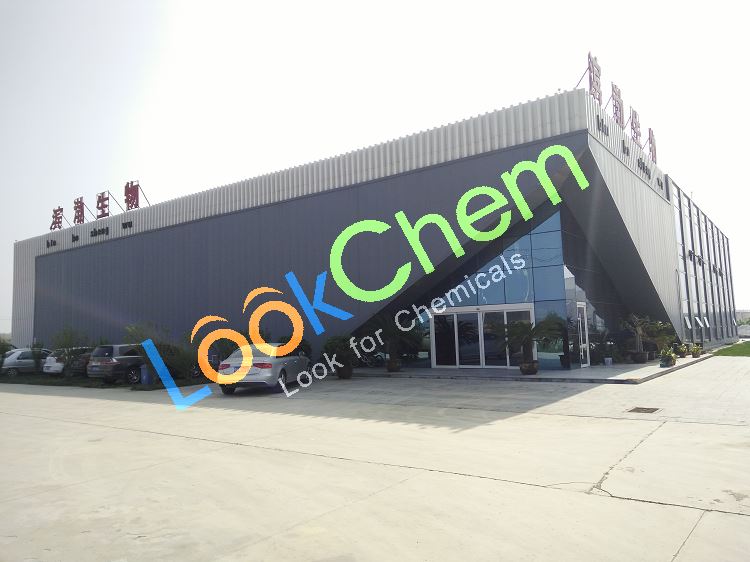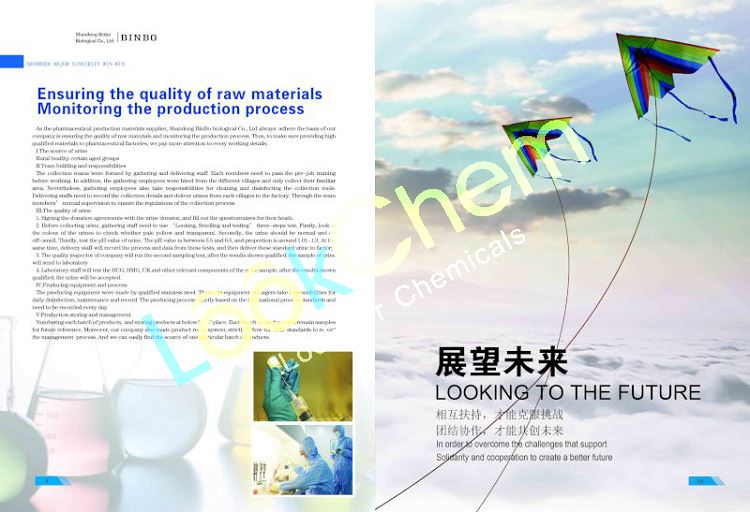
 China (Mainland)
China (Mainland)

Vegan Collagen CAS NO.9007-34-5
- FOB Price: USD: 1.00-30.00 /Kilogram Get Latest Price
- Min.Order: 1 Kilogram
- Payment Terms: L/C,D/A,D/P,T/T,Other
- Available Specifications:
1(1-10)Kilogram1(10-25)Kilogram
- Product Details
Keywords
- collagen
- vegan collagen
- 9007-34-5
Quick Details
- ProName: Collagens
- CasNo: 9007-34-5
- Molecular Formula: C4H6N2O3R2.(C7H9N2O2R)n
- Appearance: off white powder
- Application: pharmaceutical industry
- DeliveryTime: 2-3 days after payment
- PackAge: (1). 1-10kg / foil bag (2). 25kg / d...
- Port: SHANGHAI
- ProductionCapacity: 1000 Kilogram/Month
- Purity: 99%
- Storage: Store in cool & dry place
- Transportation: 1.Air Courier Express Door to Door Ser...
- LimitNum: 1 Kilogram
- Heavy Metal: <10ppm
- Limited Quantity: NA
- Valid Period: 24 MONTHS
Superiority
* Collagen is the main structural protein in the extracellular space in the various connective tissues in animal bodies. As the main component of connective tissue, it is the most abundant protein in mammals, making up from 25% to 35% of the whole-body protein content.
* Depending upon the degree of mineralization, collagen tissues may be rigid (bone), compliant (tendon), or have a gradient from rigid to compliant (cartilage). It is also abundant in corneas, cartilage, bones, blood vessels, the gut, intervertebral discs, and the dentin in teeth.
* In muscle tissue, it serves as a major component of the endomysium. Collagen constitutes one to two percent of muscle tissue, and accounts for 6% of the weight of strong, tendinous muscles.
Binbo Biological Products Co. Ltd., is a professional high-tech enterprise which engaged in Biological products and raw materials. Binbo is engaged in R&D with perfect equipments and advanced detecting instruments. The factory is in strict accordance with GMP standard in the course of design and construction.
Details


We offer Plant Source Vegan Collagen
What is collagen
Collagen is a hard, insoluble and fibrous protein that makes up one-third of the protein in the human body.In the majority of collagens, the molecules are packed together to form very similar long thin fibrils.
According to MediLexicon, collagen comprises a family of genetically distinct molecules, all of which have a unique triple helix configuration of three polypeptide subunits known as alpha-chains.
Each chain contains around 1,000 amino acids, and usually features an amino acid sequence consisting of glycine, proline and hydroxyproline.
There are numerous different types of collagen, at least 16 types, but 80-90% of collagens in the body belong to types I, II and III. The collagens in the human body are strong and flexible. Type I collagen fibrils are particularly tensile, and are stronger than steel, gram for gram.
Collagen and the body
Collagen is most commonly found in the skin, bones and connective tissue within the body, providing structural support, strength and a degree of elasticity (in combination with elastin). In particular, collagens can be found in the extracellular matrix - an intricate network of macromolecules that determine the physical properties of body tissues.
In the middle layer of the skin - the dermis - collagen helps form a fibrous network, upon which new cells can grow. Collagen is also required in the replacement and restoration of dead skin cells. Some collagens also function as protective coverings for delicate organs in the body such as the kidneys.
Collagen production naturally declines with age, reducing the structural integrity of the skin and leading to sagging skin, the formation of lines and wrinkles and the weakening of cartilage in joints.
Collagen is secreted by a variety of different cells, but primarily by connective tissue cells. While young, the body consistently produces collagen, but collagen synthesis begins to decline around the age of 40, with a dramatic reduction in synthesis in women after menopause. By the age of 60 there is typically a considerable decline in collagen production.
Medical uses of collagen
Collagen is resorbable (can be broken down and assimilated by the body), is functionally diverse and is naturally occurring. This means that collagen has several different medical applications and can be used with a variety of medical devices. In addition, it can be formed into compacted solids or lattice-like gels when being prepared for use, making it clinically versatile.
Collagen that is used medically can originate from human, bovine, porcine and ovine sources.
Skin fillers2
Injections of collagen can improve the contours of the skin and fill out depressions. Collagen can be used cosmetically to remove various lines and wrinkles from the face, as well as scarring (including acne), so long as the scars do not have a sharp edge.
Collagen fillers can originate from human and bovine sources.12Use of injected collagen can be restricted in people with severe allergies, and skin tests are typically required before bovine collagen is used.
Collagen is used to fill relatively superficial defects. More extensive defects are usually filled with substances such as fat, silicone or implants.
Increasing collagen production
The growth of collagen, elastin, and melanin can all be stimulated through laser therapy, involving intense wavelengths of light.18 This method can be used in the treatment of stretch marks.
Collagen, like all proteins, is made up of amino acids. Of these amino acids, nine are considered essential, i.e. they cannot be synthesized by the body and must be acquired through the diet.
Other nutrients that may support collagen formation include:
Proline: found in egg whites, meat, cheese, soy and cabbage
Anthocyanidins: found in blackberries, blueberries, cherries and raspberries
Vitamin C: found in oranges, strawberries, peppers and broccoli
Copper: can be found in shellfish, nuts, red meat and some drinking water
Vitamin A: found in animal-derived foods and in plant foods as beta-carotene.
What damages collagen
There are a number of factors that can deplete the levels of collagen found within the body. Avoiding the following could keep the skin healthy for longer:
High sugar consumption: a diet high in sugar increases the rate of glycation, a process whereby sugar in the blood attaches to proteins to form new molecules called advanced glycation end products (AGEs). AGEs damage adjacent proteins and can make collagen dry, brittle, and weak.
Smoking: many of the chemicals present in tobacco smoke damage both collagen and elastin in the skin. Nicotine also narrows the blood vessels in the outer layers of the skin, which reduces the delivery of nutrients and oxygen to the skin, compromising skin health.
Sunlight: Ultraviolet rays in sunlight cause collagen to break down at an increased rate, damaging collagen fibers and inducing the accumulation of abnormal elastin. Abnormal elastin leads to the production of an enzyme that can also break down collagen. This process can lead to the formation of solar scars.

|
Basic information |
|
|
Name |
Vegan Collagen |
|
Appearance |
White or white like powder |
|
Odor |
No smell |
|
Impurity |
No visible exogenous impurity |
|
Protein |
≥95% |
|
Moisture |
<8% |
|
Ash |
<2% |
|
Heavy Metals |
|
|
Heavy metals |
<20mg/kg |
|
As |
<0.5PPM |
|
Hg |
<0.5PPM |
|
Microbiology |
|
|
Total Plate Count |
<1000cfu/g |
|
Yeast & Mold |
<100cfu/g |
|
E.Coli |
Negative |
|
Salmonella |
Negative |

1.Collagen can be used as healthy foods; it can prevent cardiovascular disease;
2.Collagen can serve as a calcium food;
3.Collagen can be used as food additives;
4.Collagen can be widely used in frozen food, beverages, dairy products, candy, cakes and so on;
5.Collagen can be used for special populations (Menopausal women);
6.Collagen can be used as food packaging materials.



1. Air Courier Express Door to Door Service (DHL / TNT / FEDEX / UPS / EMS)
2. Normal Air
3. Normal Sea



Binbo Biological Co., Ltd. is located in the convenient transportation and beautiful scenery of Jining high-technology industrial zone - Jinxiang economic Development Zone. There is a 105 National road links north and south when Zaocao and Dongfeng Roads connect east and west. Besides, provincial expressway and Ji-Xu expressway which connect Beijing,Shanghai,Fuzhou, and several cities across the JinXiang economic development zone. More importantly, there are only 20 km to Jining airport and close to Qufu high-speed railway station.These convenient geographical conditions bring the development opportunities for this economic development zone.
Binbo Biological Products Co. Ltd., is a professional high-tech enterprise which engaged in Biological products and raw materials. Company was established in 2001, currently our company has more than 28 thousand square meters covering area. Factory buildings and workshops were establishsd by modern production requirements.There are three steps of development project which planned to invest around 60 million RMB. Currently the first step were finished and spent 28 million RMB, which met the production and office requirements.
Binbo is engaged in R&D with perfect equipments and advanced detecting instruments. The factory is in strict accordance with GMP standard in the course of design and construction.




FAQ

Any interests, any questions please don’t hesitate to contact us.
BINBO at your service.








